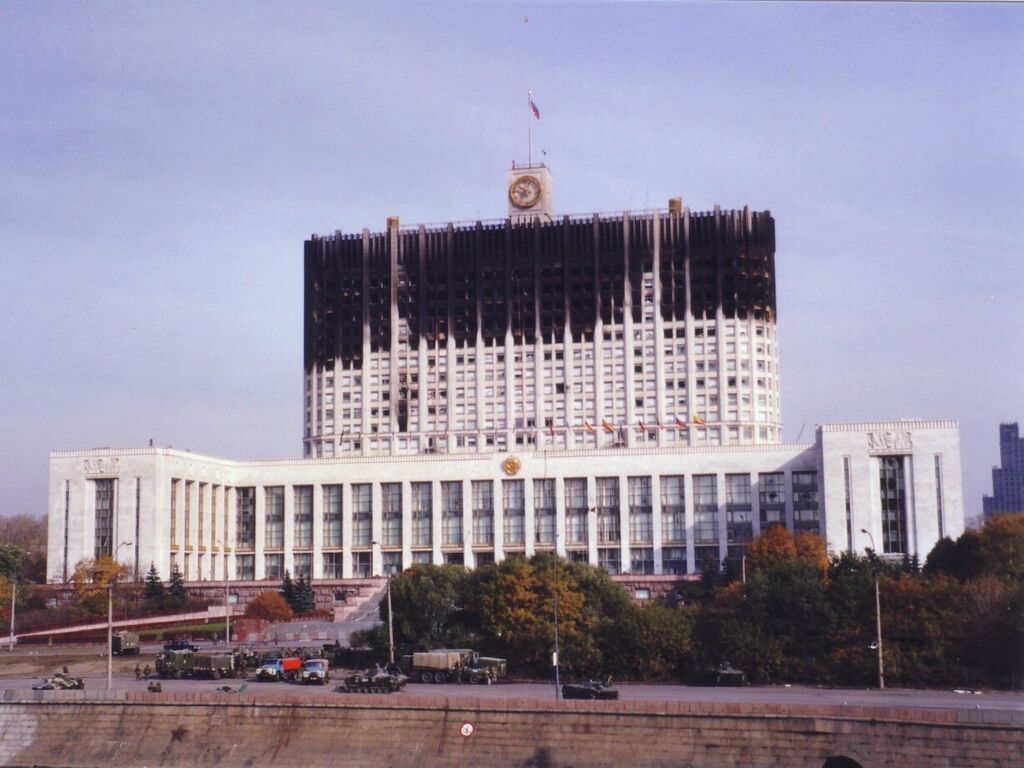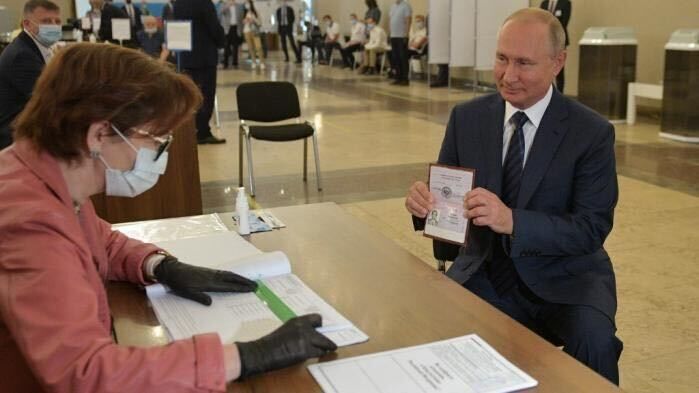On the 12th of December, Russia commemorates the adoption of its Constitution in 1993. Against the backdrop of large-scale domestic repression and increasing depoliticisation, Russian philosopher Peter Safronov argues that discussing a new constitution is needed to restore political engagement. He explains how this could contribute to bridging the increasing divides within Russian society. According to Safronov, currently affiliated with the University of Amsterdam, Russian citizens can and should start talking about what they want their country to be in the future.
 The White House, the Russian parliament in October 1993, after the government troops assaulted the building. Photo Wikimedia
The White House, the Russian parliament in October 1993, after the government troops assaulted the building. Photo Wikimedia
By Peter Safronov
For 20 years, there has been an unspoken social contract in Russia between the authorities and people: the possibility of prosperity and personal happiness demands non-participation in politics. Citizens and their organisations fighting for the right to engage in politics face the full force of the state machine. The war intensifies inherent depoliticisation of Russian society. A significant number of citizens are self-disengaged from any assessment of what is happening. Can we hope that a society that cannot carry out internal dialogue will be able to responsibly participate in global communication? Obviously not. Resuming discourse on core constitutional principles of the Russian future by Russian citizens themselves is an essential step toward peace and international cooperation.
It's time to open up a conversation about norms, ideas, and ideals. Although some opinion polls (mostly paid for by the federal government) suggest otherwise, the ongoing war is not uniting Russian society, but dividing it even more. The divide between supporters and opponents of the war does not run along age, ethnic, gender or religious lines. Data from one of the largest independent human rights organisations in Russia shows that protests against the war are continuing and that the number of criminal cases against those who oppose Russian aggression is growing. The protesters include students and pensioners, residents of Moscow and small towns, men and women.
The ongoing war is dividing Russian society even more
How can we counter the division and alienation between different groups of Russian citizens, as well as between the country's residents and its government? How can Russian society find forms of political process and political engagement that increase citizens' faith in political institutions? Today's opponents of civil liberties will not become pillars of democracy overnight. However, Russian citizens can and should start talking about what they want their country to be in the future. And that conversation will have to start from the very basics with revision of constitutional thinking.
The hastily adopted Constitution of 1993
In a recent August letter from prison, Alexei Navalny, perhaps Europe's best-known Russian opposition figure, openly confessed his hatred of the cynicism of Russian political elites, who since 1991 have put their immediate self-interest above the common good of the people. Navalny also spoke directly about the 1993 Constitution. He wrote: ‘I hate the authors of the most stupid authoritarian constitution, which they sold to us idiots as democratic, even then giving the president the power of a full-fledged monarch.’
After the collapse of the USSR in 1991, newly independent Russia struggled to create functioning state institutions amid social and economic turmoil. Two centres of power emerged, which didn't succeed to agree on a new constitution. Eager to show strength and retain power, President Yeltsin refused to negotiate with the legislature in September 1993 and issued an illegal decree dissolving parliament. In early October 1993, bloody clashes broke out in Moscow. Using the army, President Yeltsin emerged victorious. In December, a referendum hastily adopted a new constitution and elections were held for a new parliament.
Democracy was dealt an irreparable blow. It was clearly demonstrated to the citizens of the country that military force, not the strength of arguments, is decisive in politics. Cynicism and doubts about the importance of any ideals spread. In essence, uncontrolled enrichment became the ruling ideology. Russia has since then become a model student in the school of global neoliberalism, although the amount of state and semi-state owned companies is growing. Yet these companies continue to use infrastructures of global capitalism. The cynical gap between the political rhetoric of confrontation and the joint making of money (and money laundering in the West and elsewhere in the world) is obvious.
A constitution as a mirror of the regime in power
The Constitution of 1993 was amended in 2020, which further shifted the balance of power towards the institution of the presidency. Thus, the Russian Constitution is now completely discredited. Amendments to the text of the Constitution ensured that Putin could stand for election twice more, in 2024 and 2030. The Constitution has thus been openly and shamelessly turned into a tool to ensure the legitimacy of the incumbent president.
 Putin votes for the constitutional amendments, which allow him to stand for reelection twice more. Photo Kremlin
Putin votes for the constitutional amendments, which allow him to stand for reelection twice more. Photo Kremlin
In addition, the Constitution contains a reference to 'traditional values', which allegedly serve as the foundations of Russian society. However, the text of the Constitution does not contain any clear definition of these values, creating an opportunity to use the basic law of the state to persecute dissidents. Thus, the Constitution in force in Russia has become a mirror of the current regime, built on the preservation of personal power and influence while using references to morality without clear content.
The current Constitution becomes an instrument to suppress individual liberties and bolster aggressive foreign policies
With its amendments, the current Russian Constitution pushes Russia into conflict with all those inside and outside the country who dare to understand the content of morality differently. The reference to traditional values now inserted in the text of the Russian Constitution is yet another expression of its deeply authoritarian anti-democratic character. In fact, it is the current Constitution that paradoxically becomes the instrument to suppress individual liberties and bolster aggressive foreign policies.
A new constitution cannot be 'granted'
It is somewhat odd that the current Russian Constitution has an extensive list of rules enshrining human rights, judicial independence, and the possibility of local self-government. The fake, sham nature of the existing Constitution becomes obvious against the backdrop of real life in Russia, which is built on the violation of human rights, unjust court rulings, and the massive discrepancy in living conditions between Moscow and the rest of the country. However, there is an important lesson to be learned for the future. Renewal of constitutional thought does not imply replacing a 'poor' constitution with a 'good' one on paper.
Renewal of constitutional thought is more than replacing a 'poor' constitution with a 'good' one on paper
The current constitution is flawed, that is a fact. Does this mean that we should first remake reality and only then pay attention to the constitution? This formulation of the question is wrong, as it continues to consider the constitution as a kind of 'superstructure' over reality or, in the worst case, as a screen for reality. In modern Russia, citizens are excluded from politics. In order to include them, they should be involved in the process of constitutional thinking. Only under this condition will the constitution cease to be perceived as a utopia separated from life.
A new Russian constitution cannot be 'granted', it can only be the result of a long horizontal discussion. This is why discussions supported by some Russian emigrant organisations with the participation of Western think tanks are insufficient. Working in the format of a closed expert club, they once again profane the idea of broad democratic participation. Moreover, these meetings naturally do not give birth to any new ideas about the future of Russia, nor do they become an example of inspiring constitutional thinking.
First step: decentralisation
The process of constitutional construction should start with Putin's authoritarianism. Which provisions of the current Russian Constitution made this possible? Citizens' mistrust of political engagement is linked to government over-centralisation. The early years of President Putin's leadership were marked by the establishment of the so-called 'vertical of power', a system of unrestricted authority of the federal government's executive authorities over parts of the federation and municipalities. Citizens' opportunities to participate in government were steadily confined to petitions and requests for assistance from Moscow.
Immediate abolishment of the institution of the presidency is thus one of the imminent stages for the renewal of democratic constitutional thinking. Decentralisation should of course go well beyond this point. An example is the organisation of the police. Currently, all police forces in Russia report to a single ministry in Moscow. As a result, regular residents and municipalities are denied the ability to truly affect the work of police officers. Therefore, a new constitution should suggest replacing the centralised police system with local policing units accountable to municipal administrations.
The path to decentralisation has to begin with the establishment of constitutional provisions
Ensuring decentralisation in such a large country as Russia is inseparable from the revival of real federalism. I do not share the belief that losing the war will lead to the disintegration of Russia in its current borders. The disintegration seems unlikely, if only for the fact that it would be detrimental to the residents of the bulk of the country's regions, which are currently reliant on federal subsidies. The path to decentralisation has to begin with the establishment of constitutional provisions. Local communities and regions should possess the authority to form their own executive and legislative bodies. It is also critical to reliably guarantee municipalities' and regions' financial autonomy.
Constitutional thinking as a start for civic engagement
Making a constitution from scratch is impossible. At the same time, new approaches to rebuilding the framework of political order in Russia are required. Through principled discussion, constitutional thinking helps to restore political engagement. Structures that would ensure the true execution of democratic norms in future Russia, like political parties, can arise from such a debating process.
The process of drafting a constitution should be seen as a way to find a language that would be suitable for negotiation between extremely diverse forces. In 1993, President Yeltsin ended the political struggle with the use of violence. The Russian Constitution, adopted then and still in force today, essentially expresses the position of the ‘winners’ of the civil war (known as the Constitutional Crisis of 1993). This Constitution is unsuitable as a language for negotiation: it is impossible to build peace with the tools of war.
No matter how sophisticated the draft of the new Russian Constitution will be, it will not be enough to reverse the existing state of things
Nobody knows for certain what should be in an ideal constitution because there is no such thing. Existing constitutions differ in length and structure, use various approaches, and target individuals who read and follow them in a variety of manners. The restoration of good governance is a complex endeavour with no assurance of success. The key goal is to make effective governance operate without betraying fundamental standards of broad civic engagement.
In politics, individual liberty is meaningless; liberty is realised through a collective cause. One such shared factor should be the resurgence of constitutionalism. Certainly, no matter how sophisticated the draft of the new Russian constitution will be, it will not be enough to reverse the existing state of things and restore citizens' trust in democratic political institutions. The purpose is to imagine certain required (but not sufficient) conditions for the restoration of just government and the reintroduction of a wide range of issues into politics. Not for the sake of hope, but for the sake of persistence that creates new worlds.
